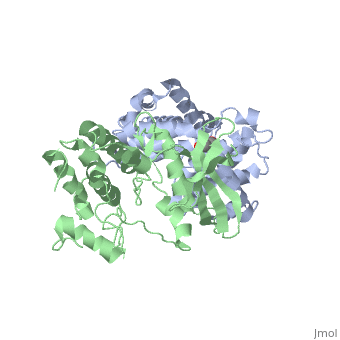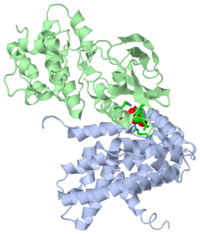Cyclin Dependent Kinase-4 (CDK4) is a protein that is used in the cell cell cycle. The scene that is currently being shown here is when CDK4 is attached to Cyclin D[1]. CDK4 by itself is just the green protein shown . This page will discuss the role of CDK4 in the cell cycle as well as CDK4's role in cancer. This page is being done as a project for a chemistry class (Chem. 461: Chemistry of Cancer) from Wabash College. See also Palbociclib, Ribociclib and Abemaciclib.
Role in the Body Experiment[1]
Cyclin Dependent Kinase-4 (CDK4) is activated by Cyclin D during the G1 Phase[2] after the G0 Phase[3] that some cells go into as a rest or dormant phase. There are three types of cyclin D: cyclin D1, cyclin D2, and cyclin D3. The CDK4-Cyclin D complexes are essential for entry in G1 phase. During the G1 Phase, a cell undergoes growth before having to divide again. Therefore, it is essential for the cell to undergo this growth in order for it to be big enough to divide.
Role in Cancer
It is known that CDK4, along with Cyclin D, is over expressed in breast cancer. Therefore, it is thought to have something to do with breast cancer formation. Actually, CDK4 is also found to be over expressed in other forms of cancer as well; therefore, the study that Qunyan Yu, et al. performed could lead to other studies with different types of cancer.
Yu, Qunyan, et al. Experiment[2]
CDK4 was found to be over expressed in breast cancer. Qunyan Yu, et al. created an experiment using mice. They performed three experiments involving CDK4 and breast cancer.
Experiment 1
For the first experiment, mice were tested to see if the the CDK4 protein is over expressed in tumors that were formed on the mice. They found that a lack of CDK4 made mice resistant to breast cancer.
Experiment 2
In the second experiment, they took mammary fad pads with high levels of D1-CDK4 complexes out of the mice and injected them with siRNA[4] which reduced the CDK4 levels. They found that the reduction of CDK4 blocked the ability for tumors to form. They occasionally found small tumors in the mice with siRNA infection; however, they also found high levels of CDK4 in those tumors.
Experiment 3
In the third and final experiment, the mice's CDK4 in murine breast cancer cells were replaced with human wild type and kinase dead CDK4. The experimenters found that the dead CDK4 was unable to form tumors. The wild type CDK4 did form tumors; however, the tumors were about 50% of the size from the tumors seen in Experiment 2.
Disscussion
It was found that lack CDK4 are resistant to mammary carcinomas triggered by the ERbB-2 oncogene[5]. The kinase activity of cyclin D1-CDK4 complexes is required for both initiation of breast cancer and maintaining tumor cell proliferation. Therefore, CDK4 is essential to form breast cancer and for the tumor cells to grow.
3D Structures of Cyclin-dependent kinase 4
See Cyclin-dependent kinase
Additional Resources
For additional information, see: Cancer


